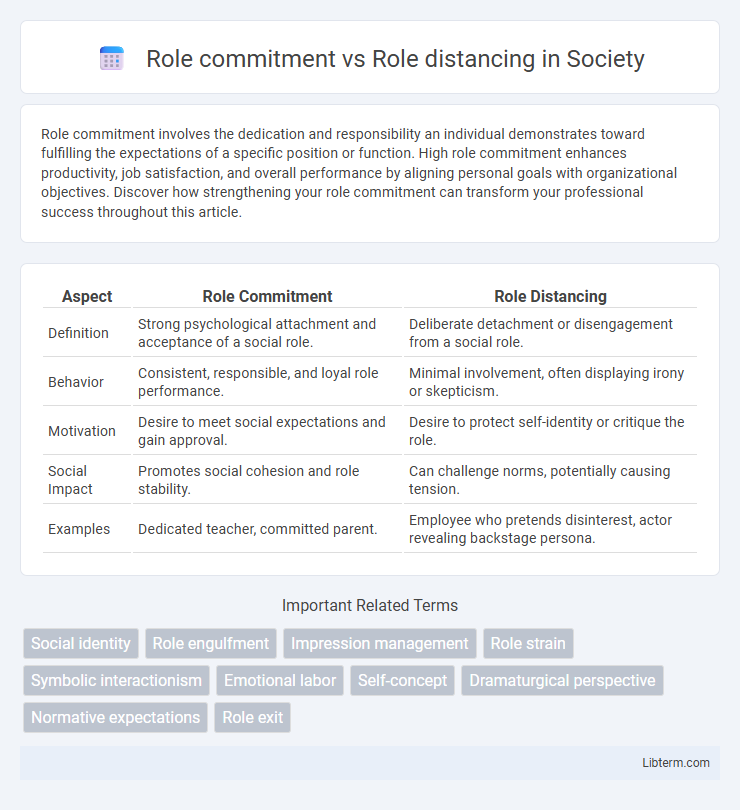Role commitment involves the dedication and responsibility an individual demonstrates toward fulfilling the expectations of a specific position or function. High role commitment enhances productivity, job satisfaction, and overall performance by aligning personal goals with organizational objectives. Discover how strengthening your role commitment can transform your professional success throughout this article.
Table of Comparison
| Aspect | Role Commitment | Role Distancing |
|---|---|---|
| Definition | Strong psychological attachment and acceptance of a social role. | Deliberate detachment or disengagement from a social role. |
| Behavior | Consistent, responsible, and loyal role performance. | Minimal involvement, often displaying irony or skepticism. |
| Motivation | Desire to meet social expectations and gain approval. | Desire to protect self-identity or critique the role. |
| Social Impact | Promotes social cohesion and role stability. | Can challenge norms, potentially causing tension. |
| Examples | Dedicated teacher, committed parent. | Employee who pretends disinterest, actor revealing backstage persona. |
Understanding Role Commitment and Role Distancing
Role commitment involves an individual's strong identification with and dedication to their social or professional responsibilities, resulting in consistent behavior aligned with role expectations. Role distancing occurs when a person deliberately detaches from their role to maintain individuality or avoid stigma, often demonstrating minimal emotional investment or altered behavior patterns. Understanding these concepts highlights the balance individuals maintain between fulfilling societal roles and preserving personal identity.
Defining Key Concepts: Role Commitment
Role commitment refers to the degree of psychological attachment and dedication an individual has towards fulfilling the expectations and responsibilities associated with a particular social role. It involves embracing the role's identity, demonstrating consistent behavior aligned with role norms, and investing effort to maintain role performance over time. High role commitment often leads to greater satisfaction, stability, and success within the given role, contrasting with role distancing where individuals consciously detach from role expectations.
Defining Key Concepts: Role Distancing
Role distancing refers to the deliberate effort by individuals to separate themselves emotionally or behaviorally from the roles they occupy, reducing personal identification with role expectations. This psychological strategy helps manage stigma, stress, or conflict associated with certain social or professional positions. Understanding role distancing is crucial for analyzing how individuals negotiate identity and social pressures within their roles.
Psychological Foundations Behind Role Behavior
Role commitment reflects a strong psychological attachment to one's social role, driven by identity conformity and a desire for approval, enhancing consistent behavior aligned with role expectations. In contrast, role distancing involves a deliberate psychological detachment from the role, motivated by self-protection or resistance to stigma, allowing individuals to maintain autonomy and reduce role-related stress. Understanding these psychological mechanisms helps explain variations in role enactment and the negotiation of social identities within diverse contexts.
Factors Influencing Role Commitment
Role commitment is influenced by factors such as personal identification with the role, perceived value and rewards, and the level of support from peers and supervisors. Intrinsic motivation and alignment with individual values tend to strengthen role commitment, while role ambiguity and conflicting expectations can weaken it. Organizational culture and clear communication also play critical roles in enhancing commitment by fostering a sense of belonging and purpose.
Factors Influencing Role Distancing
Role distancing occurs when individuals detach themselves from the expectations and responsibilities associated with a social position to protect their self-identity or avoid negative perceptions. Factors influencing role distancing include the stigma attached to the role, lack of intrinsic motivation, conflicting personal values, and perceived low social status or recognition. Environmental pressures, such as organizational culture or peer attitudes, also significantly impact the extent to which individuals engage in role distancing.
Impact of Role Commitment on Personal Identity
Role commitment significantly shapes personal identity by fostering a strong sense of purpose and self-worth linked to the roles individuals occupy. High role commitment enhances psychological well-being and stability, as individuals internalize the values and expectations associated with their roles. In contrast, weak role commitment may lead to identity confusion and diminished self-esteem, highlighting the crucial impact of role investment on personal identity development.
Impact of Role Distancing on Social Interaction
Role distancing, characterized by individuals deliberately minimizing identification with their social roles, significantly alters social interaction by creating emotional barriers and reducing authentic engagement. This behavior often leads to decreased trust and weakened social bonds as individuals appear less invested or sincere in their interactions. Consequently, role distancing can hinder effective communication and collaboration, ultimately impacting group cohesion and social networks.
Real-World Examples: Balancing Commitment and Distancing
Role commitment involves deeply engaging in professional responsibilities such as a teacher investing extra hours to support student success or a nurse providing attentive patient care. Role distancing occurs when individuals deliberately detach from certain aspects of their job to maintain personal boundaries, exemplified by a social worker avoiding emotional over-involvement to prevent burnout. Effective balance between role commitment and role distancing is evident in professionals who maintain dedication while preserving mental health, like a police officer enforcing laws while using stress-relief techniques to manage the emotional toll.
Navigating Role Commitment and Distancing in Modern Society
Navigating role commitment and role distancing is critical in modern society as individuals balance professional responsibilities with personal identity. Role commitment involves deep engagement and acceptance of societal expectations, promoting consistency and reliability in social and occupational contexts. Role distancing allows individuals to maintain autonomy and protect their self-concept by selectively detaching from roles, fostering mental health and adaptability amidst changing social demands.
Role commitment Infographic

 libterm.com
libterm.com